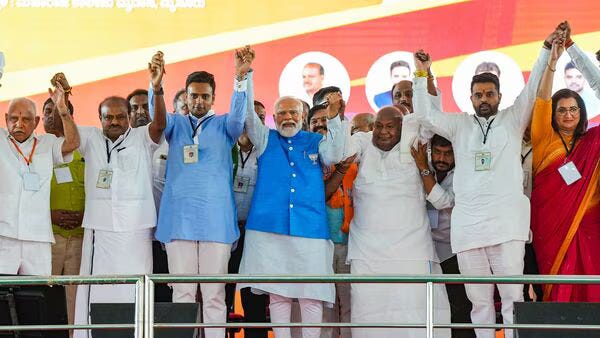Prajwal Revanna and the culture of impunity
In this story of the disgraced MP, what is notable is not the protagonist but the context which empowered and protected him
Published in The Indian Express
Prajwal Revanna, JDS MP and joint BJP-JDS candidate in Hassan, has fled to Germany after multiple video clips depicting sexual assault on women - some government employees - started circulating online and a FIR was registered on a complaint by a former employee. However, in this story of the disgraced MP, what is notable is not the protagonist but the context which empowered and protected him. It is now clear that Revanna’s behavior was known. Yet not only was no action taken against him but he was made the joint candidate for the BJP-JDS alliance with the Prime Minister himself campaigning for him.
This disturbing case lays bare several deeply troubling aspects of our political sphere. First, our political class - especially the ruling party - has repeatedly shown itself to be incapable of setting a bottom-line for acceptable behavior to be given leadership positions. The BJP has shown a special proclivity to defending and promoting rapists and perverts - Prajwal Revanna, Brij Bhushan, Bilkis Bano rapists, Kuldeep Sengar - but an instrumental detachment from norms exists across party lines. Sengar made his way across all parties in Uttar Pradesh; Revanna has been the joint candidate of two opposing alliances. It is true that in many instances, this detachment stems not from active permissiveness, but from intense partisanship. This partisanship has made the acquisition and consolidation of power the supreme value bar none. However, it would be inaccurate to argue that this detachment arises solely from political constraints, rather than also from a certain sense that ethical norms are dispensable under duress. The callous way in which the sexual assault videos were made public exposing the victimised women to further public scrutiny is indicative of this dispensability with the desire to secure justice for the women concerned of secondary importance.
Moreover, the way this incident unfolded underscores how little democratic accountability exists in practice. Revanna’s behavior was known and documented - in thousands of video clips - as also a letter written to the BJP state leader specifically on the matter. Even in the case of other offenders, it strains credulity that the truth about their behavior became known to the party apparatus only when it became known to the public. But in each instance, what propelled the party into action - whether suspension or expulsion or a slowing down of ascent - was public outrage. In this instance too, what finally made the two parties - BJP and JDS - effect distance was not the fact of Revanna’s reprehensible behavior but the completely separate fact of his behavior becoming public.
Third, it is evident that for all the rhetoric on women’s empowerment, women’s issues have not solidified into enforceable normative standards. Consequently, women are mobilised as voters and are target of welfare schemes but issues such as respect, equality, agency, and security, which are related to women’s collective consciousness remain on the periphery. In fact, even when such issues are articulated, they remain in the rhetorical realm as campaign promises or as partisan one-upmanship. It would also be a mistake to see representation alone as shorthand for political empowerment. Equitable representation is an end in itself in a democracy however political empowerment goes beyond representation to the ability to set normative standards and enforce them either through organization or collective consciousness. In fact, the cynical and trivial exertions of the National Women’s Commission and selective silences by women representatives has shown that representation must go hand in hand with norms to translate into actual empowerment for the community at large.
This normative void also points to another aspect of our democracy: the acquisition of power and its exercise remains top-down. The “people” are not coming together to power the rise of a party or a leader but are instead being mobilised from the top through a complex web of messages and party machinery. Consequently, representation often reflects top-down delegated power; nor is the electorate able to cohere together as “the people” to extract any meaningful accountability from representatives and/or political parties.
These various aspects of our political sphere interact with each other to produce a culture of impunity in which norms cannot be reliably enforced. Consequently, the onus of pursuing accountability has been forced upon individual women. In the instance of Revanna, it is not clear that the videos going viral alone would have been sufficient to impose tangible consequences if not for the courageous woman who came forward to file a police complaint. The Unnao rape survivor was able to get Sengar convicted but paid a heavy price for it, losing her father and other family members in the process. While systemic impunity extracts a high price from the fearless women who speak up, it diminishes those who operate under it too. Revana, the 33-year old MP, had enviable access to power, which he could have exercised in expansive ways to do good for his people. Instead the pervasive environment of impunity allowed him to wield his power in ways which limited his horizon to his own person and reduced him to a common street thug.

